
Ants restore Mediterranean dry grasslands
In nature, certain species are able to regulate the cycling of soil nutrients and vegetation diversity and dynamics. A team of ecologists and agronomists1 led by Thierry Dutoit, a CNRS researcher at the Mediterranean Institute of Biodiversity and Marine and Continental Ecology (CNRS/Avignon Université/IRD/Aix-Marseille Université) studied the impact of the Messor barbarus harvester ant on Mediterranean dry grasslands on the plain of La Crau. The study shows that these invertebrates accelerated the resilience of plant communities in these degraded grasslands by facilitating their recovery. Over a period of 5 to 10 years, these ants have improved soil fertility; ensured the transport, redistribution and storage of seeds, and also significantly increased the plant biomass next to their nests. This work, published online in the journal Biological Conservation (15 April 2020), demonstrates the potential key role of ants as ecological engineers for the conservation and restoration of Mediterranean dry grasslands in the medium term.

© Renaud Jaunatre/IMBE/CNRS
- 1from « Biodiversité, agroécologie et aménagement du paysage » laboratory (Inrae/Agrocampus Ouest/École supérieure d'agricultures) and Institut de recherche de la Tour du Valat
Harvester ants as ecological engineers for Mediterranean grassland restoration: Impacts on soil and vegetation. Tania De Almeida, Olivier Blight, François Mesléard, Adeline Bulot, Erick Provost and Thierry Dutoit. Published online in Biological Conservation, April 15, 2020. DOI:10.1016/j.biocon.2020.108547


